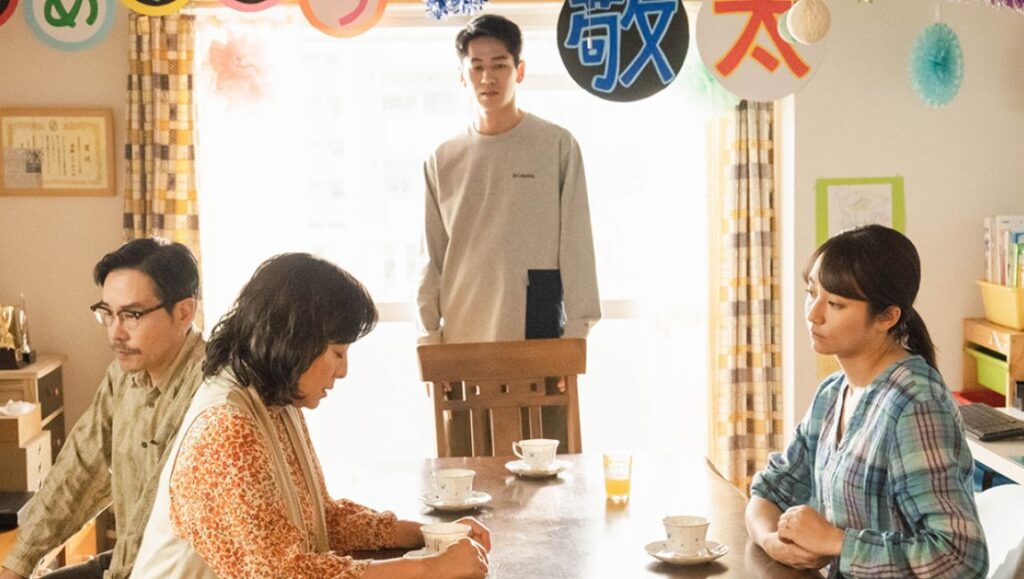Kôji Fukada has described Ozu this way: “He’s one of the true greats, while I am not.” To take a line from Hasumi’s criticism: if, “In Ozu films, the sky can only be sunny” — the mark of “a master with an extremely objective point of view” — then in Fukada’s films an emotional unraveling will be accompanied, as in Love Life, with a downpour of rain so immediate and forceful it causes a wedding to clear. This is done, brazenly, to allow for a theatrical dialogue and exit — why, we might ask, is such an intervention necessary?
Fukada’s films, since his UCR-winning Harmonium, have not lacked for prominent premieres and measured acclaim, but one would be hard-pressed to find anyone marking out the director as especially distinct. When one notices Fukada’s penchant for striking compositions, always keeping a measured distance from his characters, his past studies under the teaching of Kiyoshi Kurosawa are invoked. His melodramatic plots earn him comparison, as in his to-date strongest work, The Real Thing, to Ryûsuke Hamaguchi. And his early adoption of de-emphasized theatrical values from the company Seinendan was, along with his cinephilic interest in the films of Éric Rohmer, predictably repeated in early-career notices.
This may be because Fukada is an intentionally limited director: he concerns himself with arranging a combustible set of emotions, and then reporting on their transformation over time. Nothing can get in the way: no showpieces, no manipulative scores, no exuberant climaxes, but conversely his interests as a screenwriter demand an investment in steadily-paced narrative outgrowth, which can at times look like nothing more than belabored backstory. This gives Fukada little room to range.
In Love Life, he quickly sketches out the still-germinating roots of a newly married couple. Taeko (Kimura Fumino), previously divorced, is the mother to a son who has just turned six. The son, Keita (Shimada Tetsuta), is a rising star in competitive Othello (“Othello,” he emphasizes, “not ‘a game,’” in reply to a mildly dismissive comment). Jiro (Nagayama Kento), like his wife, works in the social services, but notably has yet to formally adopt Keita and, against the wishes of his parents, entered into this marriage on the heels of a broken engagement to Yamazaki (Yamazaki Hirona). So introduced to this environs of newly bound trust, Love Life might have it where we take these relationships as they delineate themselves, rather than as an evolving game.
But new players and rules do get introduced. In the aftermath (or, as an earthquake scene literalizes, the aftershocks) of personal disturbance, Taeko and Jiro both are unable to imagine future moves, and so adopt their pre-marital behavioral patterns: in their introductory scenes, Taeko’s ex-husband Park (Atom Sunada) and Jiro’s old flame Yamazaki bolt, and the remainder of Love Life involves a subsequent chase for meaning. Fukada, to be sure, precisely modulates how much and when we learn of the past’s gravity on the present, which is to say there is less than we might expect, and Taeko and Jiro, still married, still living together, are kept within a plausible frame of action: no one is working with a pre-meditated strategy, and everyone gets a chance to explain their self-concept.
Love Life then can best be approached as a comedown from the dizzying dramatic heights of The Real Thing, whose TV origins did not allow for anything but the most densely organized emotional stakes and formal moves of Fukada’s work to date. Here, everything is cleanly kept within bounds.
DIRECTOR: Kôji Fukada; CAST: Fumino Kimura, Kento Nagayama, Atomu Sunada; DISTRIBUTOR: Oscilloscope Laboratories; IN THEATERS: August 11; RUNTIME: 2 hr. 3 min.
Originally published as part of TIFF 2022 — Dispatch 2.


Comments are closed.